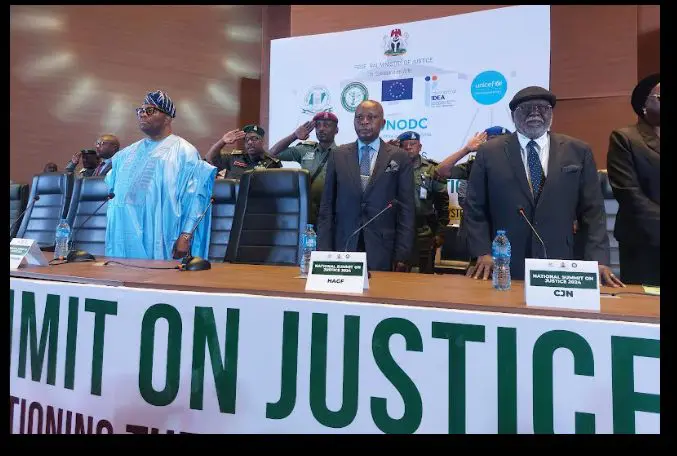
In Abuja on Wednesday, Nigerian leaders came together to advocate for the establishment of a robust justice sector that can deliver justice swiftly and fairly across the country.
Speaking at the commencement of a two-day National Summit on Justice were notable figures such as President Bola Tinubu, Senate President Godswill Akpabio, Chief Justice of Nigeria Justice Olukayode Ariwoola, and Attorney-General of the Federation and Minister of Justice Prince Lateef Fagbemi, SAN. Representatives from the European Union, United Nations office on Drugs and Crime (UNODC), and others were also present.
This summit was organized in partnership with the European Union-funded RoLAC II Programme of the International IDEA.
When declaring the summit open, Tinubu, represented by Vice President Senator Kashim Shetima, reiterated the government’s commitment to ensuring a functional and people-focused justice system in Nigeria.
He highlighted the administration’s collaborative efforts with the judiciary to address identified challenges within the sector and emphasized the need for a more responsive justice system.
In his opening remarks, Tinubu spoke of the measures taken by his administration to enhance the judiciary’s effectiveness, including harmonizing the retirement age of judicial officers and prioritizing their welfare. He also mentioned a significant increase in Judiciary funding and pending salary improvements for judges.
Tinubu stressed the importance of an effective justice system providing fair outcomes for all citizens and urged leaders in the sector to innovate and work towards solutions to existing challenges.
Akpabio, in his address, emphasized the summit’s actionable nature, where expert recommendations should translate into policies addressing current inefficiencies and future hurdles within the justice system.
He acknowledged delays and backlogs in the court system that hinder timely justice delivery and erode public trust in the judiciary. Akpabio proposed reforms regarding interlocutory appeals and the requirement for the Attorney General’s consent before executing judgments to streamline judicial processes and ensure prompt resolutions.
The Senate President advocated for reforms to prevent the misuse of ex parte orders in political cases, urging oversight from the National Judicial Council to deter judicial misconduct and abuse of authority.
Chief Justice of Nigeria, Olukayode Ariwoola, highlighted the need for legal framework reforms to make justice more accessible to Nigerians, calling for technology adoption to combat corruption and inefficiency within the judiciary.
Attorney General of the Federation and Minister of Justice Lateef Fagbemi reiterated the sector’s focus on developing policies for fair and efficient justice dispensation and emphasized the push for judicial independence and welfare enhancement.
RoLAC II National Programme Manager Danladi Plang pointed out that quality justice reforms are crucial for attracting foreign direct investment, as a functional justice system is integral to economic growth and investor confidence.
Plang emphasized the importance of efficient justice processes in both commercial and criminal cases to ensure swift resolutions and prevent prolonged detentions.
